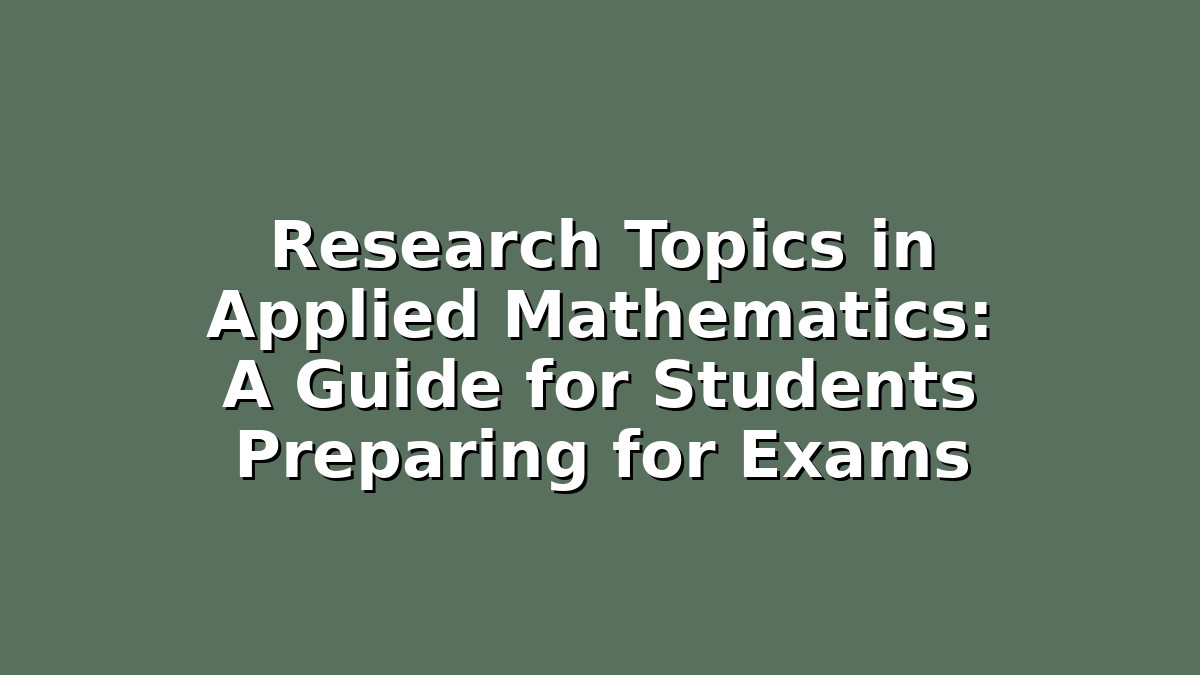Applied mathematics is a fascinating and dynamic field that bridges the gap between theoretical mathematics and practical problem-solving in science, engineering, economics, and beyond. For students preparing for exams or looking to deepen their understanding, choosing the right research topics can be both exciting and challenging. Exploring applied mathematics topics not only strengthens your grasp of concepts but also equips you with analytical skills essential for academic success and future careers.
In this blog article, we’ll walk you through some compelling research topics in applied mathematics. We’ll also provide practical study tips tailored to help you excel in your exams while exploring these topics. Whether you’re gearing up for university assessments or interested in research projects, this guide aims to encourage and empower you on your mathematical journey.
1. Mathematical Modeling and Its Applications
One of the most engaging areas in applied mathematics is mathematical modeling—the process of translating real-world phenomena into mathematical language and equations. This topic is especially relevant for students interested in biology, physics, economics, or environmental science.
Why Choose This Topic?
Mathematical modeling is everywhere—from predicting the spread of diseases to optimizing supply chains. It offers a hands-on approach to understanding how mathematics can solve practical problems.
Key Subtopics to Explore:
– Population dynamics models (e.g., predator-prey models)
– Epidemiological models (e.g., SIR models for infectious diseases)
– Economic modeling (e.g., market equilibrium, game theory)
– Environmental modeling (e.g., climate change simulations)
Study Tips:
– Visualize the problem: Use diagrams or flowcharts to understand the system before jumping into equations.
– Work on examples: Try solving simple models step-by-step to build confidence. Focus on interpreting the results, not just solving the math.
– Relate to real life: Connect models to current events or case studies to make the material more relatable and memorable.
– Practice exam-style questions: Many exams test your ability to set up models or interpret outcomes rather than just compute answers. Practice these types of questions to prepare effectively.
2. Numerical Methods and Computational Techniques
Applied mathematics heavily relies on numerical methods to solve problems that are too complex for analytical solutions. This research topic is particularly useful for students interested in programming, engineering, and computer science.
Why Choose This Topic?
With the rise of computers and software, numerical methods have become indispensable. Understanding these techniques can help you tackle real-world problems involving differential equations, optimization, or data analysis.
Key Subtopics to Explore:
– Numerical solutions of differential equations (Euler’s method, Runge-Kutta methods)
– Interpolation and approximation methods
– Numerical integration and differentiation
– Optimization algorithms (e.g., gradient descent)
– Error analysis and stability of numerical methods
Study Tips:
– Practice coding: Implement algorithms in programming languages like Python, MATLAB, or R. Practical coding exercises reinforce theoretical concepts.
– Break down algorithms: Understand each step of an algorithm rather than memorizing formulas. Sketch flowcharts to map out the process.
– Use software tools: Familiarize yourself with computational tools that your course recommends. They can save time and help visualize results.
– Work on past papers: Many exams include numerical problems that require algorithmic thinking. Practicing these will sharpen your problem-solving speed and accuracy.
3. Optimization and Operations Research
Optimization is about finding the best solution under given constraints, a topic widely applied in logistics, finance, engineering, and decision science. Operations research (OR) is closely related and focuses on using mathematical methods to make better decisions.
Why Choose This Topic?
Optimization and OR are highly practical and often form the core of applied mathematics curricula. These topics are great for students interested in business analytics, management science, or engineering design.
Key Subtopics to Explore:
– Linear programming and the simplex method
– Integer programming and combinatorial optimization
– Network flows and transportation problems
– Queuing theory and inventory management
– Multi-objective optimization
Study Tips:
– Master the theory: Make sure you understand fundamental concepts like feasible regions, objective functions, and constraints.
– Solve varied problems: Apply methods to different types of optimization problems to gain versatility.
– Visual aids: Graphical solutions to linear programming problems can help you grasp concepts more intuitively.
– Group study: Discussing problems with peers can expose you to alternative approaches and clarify difficult points.
Conclusion
Applied mathematics offers a rich landscape of research topics that blend theory with real-world applications. Whether you dive into mathematical modeling, numerical methods, or optimization, each area provides valuable skills that go beyond exams—they prepare you for diverse academic and career paths.
Remember, the key to success in applied mathematics lies not only in memorizing formulas but in deeply understanding concepts and practicing problem-solving regularly. Use visualization, practical examples, coding exercises, and group discussions to bolster your study sessions. Stay curious and persistent, and you’ll find that applied mathematics becomes an exciting subject rather than a daunting one.
Above all, believe in your ability to learn and overcome challenges. Every problem you solve is a step closer to mastering the subject and achieving your academic goals. Good luck with your exams and research projects!

Responses